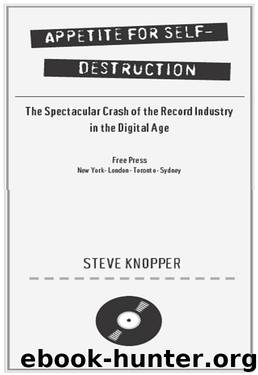Appetite for Self-Destruction by Steve Knopper

Author:Steve Knopper [Knopper, Steve]
Language: eng
Format: epub, mobi
Publisher: Simon and Schuster
Published: 2009-01-05T21:00:00+00:00
NAPSTER WENT AWAY, but file sharing did not.
Even as Napster was growing rapidly, in mid-1999, hackers were writing and distributing flawed but operable imitations like CuteMX and iMesh. The most sophisticated new file-sharing service came from Justin Frankel, the onetime hacker extraordinaire who had invented a popular, pre-Napster piece of MP3-playing software called Winamp. Living in San Francisco in 1999, Frankel and Shawn Fanning became friendly, mostly due to their shared interest in speedy cars, and Fanning had an inkling Frankel was about to release something powerful and competitive. Sure enough, Franklin soon introduced a new software called Gnutella. From a user perspective, it worked a lot like Napster—you could plug an artist name or song title into a search engine, then download whatever song happened to come up. The crucial difference was that Gnutella didn’t have one central server—it relied on a clever high-tech system in which each user (or “node”) functions as his own server. There was no central, Napster-like entity or company for record industry lawyers to sue. And unlike Napster, Gnutella was owned by America Online, which had purchased Frankel’s small high-tech company Nullsoft. Proud of their Gnutella accomplishment, Nullsoft’s employees posted the new software on the AOL website in March 2000. But AOL was in the process of merging with Time Warner, owner of Warner Music, not a fan of file-sharing services—especially ones it couldn’t sue. Within two days, after reporters got wind of Gnutella and pressed AOL officials about it, the corporation yanked the software from the service. But the genie, as they say, was out of the bottle; worldwide users had already downloaded the software and were using it to create file-sharing systems such as LimeWire and BearShare.
This was a prominent example of how, after the January 2001 merger, the high-tech, internet-boom visionaries at AOL didn’t exactly mesh seamlessly with the old-media guard at Time Warner. At first, Howie Klein, president of Warner-owned Reprise Records, who had been frustrated with the music industry’s slow response to the downloading crisis, was excited about this new influx of high-tech experts. He and a few internet-savvy colleagues approached their AOL highers-up with a proposal for a new music-download store, which, as Klein recalls, resembled an early iTunes. “The AOL people said, ‘This could be dangerous,’ and passed on the idea,” he recalls. “As soon as AOL took over, the message was, ‘We’re paying too much for health insurance for our employees.’ And: ‘Hey, you’re being a pussy with these artists, you’re giving them too much and being overly generous and taking away from us.’” Klein quit the company soon after the merger. But an AOL executive who briefly worked on a music deal told Kara Swisher of the Wall Street Journal that Warner was the one refusing to innovate: “Neither Warner Music nor anyone else there ever accepted that if we could crack the code, there might be whole new ways to market [online].” Meanwhile, the high-tech portion of the company was more sympathetic to Napster than it let on in public.
Download
Appetite for Self-Destruction by Steve Knopper.epub
Appetite for Self-Destruction by Steve Knopper.mobi
This site does not store any files on its server. We only index and link to content provided by other sites. Please contact the content providers to delete copyright contents if any and email us, we'll remove relevant links or contents immediately.
| Biographies | Business |
| History & Criticism | Instruments |
| Musical Genres | Recording & Sound |
| Reference | Songbooks |
| Theory, Composition & Performance |
The Goal (Off-Campus #4) by Elle Kennedy(12423)
Kathy Andrews Collection by Kathy Andrews(10506)
Diary of a Player by Brad Paisley(6863)
What Does This Button Do? by Bruce Dickinson(5519)
Assassin’s Fate by Robin Hobb(5228)
Big Little Lies by Liane Moriarty(4876)
Pale Blue Dot by Carl Sagan(3995)
Sticky Fingers by Joe Hagan(3449)
The Heroin Diaries by Nikki Sixx(2928)
The Death of the Heart by Elizabeth Bowen(2895)
Beneath These Shadows by Meghan March(2712)
The Help by Kathryn Stockett(2700)
Confessions of a Video Vixen by Karrine Steffans(2668)
How Music Works by David Byrne(2519)
Jam by Jam (epub)(2480)
Harry Potter 4 - Harry Potter and The Goblet of Fire by J.K.Rowling(2413)
Strange Fascination: David Bowie: The Definitive Story by David Buckley(2364)
Petty: The Biography by Warren Zanes(2234)
Darker Than the Deepest Sea by Trevor Dann(2205)
